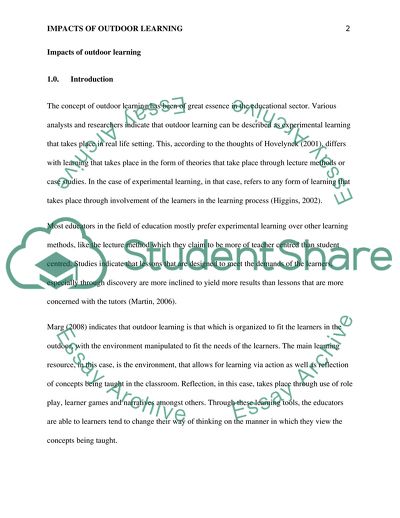Cite this document
(Impacts of Outdoor Learning Essay Example | Topics and Well Written Essays - 2250 words, n.d.)
Impacts of Outdoor Learning Essay Example | Topics and Well Written Essays - 2250 words. https://studentshare.org/education/1770072-using-an-established-literature-base-critically-reflect-upon-your-professional-learning-and-development-with-a-particular-pedagogical-focus-on-the-basis-of-this-suggest-personal-and-professional-development-targets-for-your-induction-year-eg-using
Impacts of Outdoor Learning Essay Example | Topics and Well Written Essays - 2250 words. https://studentshare.org/education/1770072-using-an-established-literature-base-critically-reflect-upon-your-professional-learning-and-development-with-a-particular-pedagogical-focus-on-the-basis-of-this-suggest-personal-and-professional-development-targets-for-your-induction-year-eg-using
(Impacts of Outdoor Learning Essay Example | Topics and Well Written Essays - 2250 Words)
Impacts of Outdoor Learning Essay Example | Topics and Well Written Essays - 2250 Words. https://studentshare.org/education/1770072-using-an-established-literature-base-critically-reflect-upon-your-professional-learning-and-development-with-a-particular-pedagogical-focus-on-the-basis-of-this-suggest-personal-and-professional-development-targets-for-your-induction-year-eg-using.
Impacts of Outdoor Learning Essay Example | Topics and Well Written Essays - 2250 Words. https://studentshare.org/education/1770072-using-an-established-literature-base-critically-reflect-upon-your-professional-learning-and-development-with-a-particular-pedagogical-focus-on-the-basis-of-this-suggest-personal-and-professional-development-targets-for-your-induction-year-eg-using.
“Impacts of Outdoor Learning Essay Example | Topics and Well Written Essays - 2250 Words”. https://studentshare.org/education/1770072-using-an-established-literature-base-critically-reflect-upon-your-professional-learning-and-development-with-a-particular-pedagogical-focus-on-the-basis-of-this-suggest-personal-and-professional-development-targets-for-your-induction-year-eg-using.


